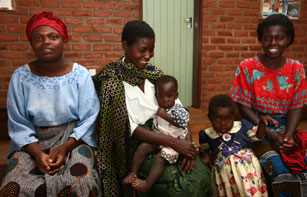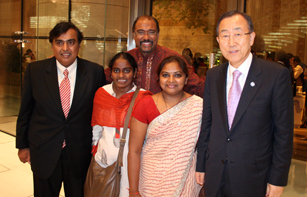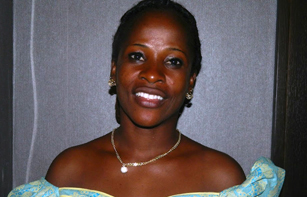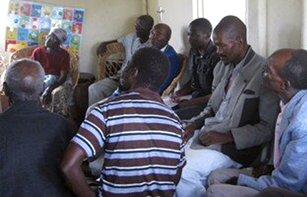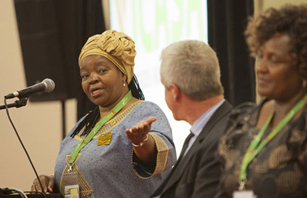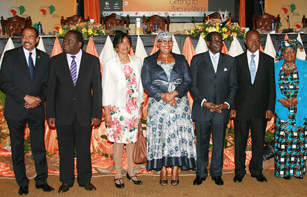
Group picture at the launch of the GlobalPOWER Women Network Africa meeting in Harareon 24 May. From left to right: Mr Michel Sidibé, UNAIDS Executive Director; HE Morgan Tsvangirai, Prime Minister of Zimbabwe; Dr Navanethem Pillay, United Nations High Commissioner for Human Rights; Hon Thokozani Khupe, Deputy Prime Minister of Zimbabwe; HE Robert Mugabe, President of Zimbabwe; Hon Erastus Mwencha, Deputy Chairperson of the African Union Commission; and Dr Ngozi Okonjo-Iweala, Minister of Finance, Nigeria.
Credit: UNAIDS/D.Kwande
UNAIDS Executive Director Michel Sidibé concluded his first official visit to Zimbabwe on 25 May after meeting with President Robert Mugabe and Prime Minister Morgan R. Tsvangirai to highlight the country’s progress in the AIDS response.
President Mugabe and Mr Sidibé met on the sidelines of the inaugural meeting of the GlobalPOWER Women Network Africa, which was launched in Harare on 24 May. In their meeting, they reviewed Zimbabwe’s success in mitigating the impact of HIV as well as the opportunities to further the country’s response.
Mr Sidibé commended the collective efforts made by the Government of Zimbabwe for having maintained community engagement and service provision to expand access to HIV prevention and treatment services during a difficult period. “The Government of Zimbabwe’s support for the national AIDS response bridges parties and portfolios,” said Mr Sidibé. “This has resulted in a significant reduction of adult HIV prevalence and a steady decline in the number of new HIV infections.”
Zimbabwe has achieved one of the sharpest declines in HIV prevalence in Southern Africa, from 27% in 1997 to just over 14% in 2010. With 10 times fewer resources for AIDS per capita than other countries in sub-Saharan Africa, Zimbabwe has expanded coverage of antiretroviral treatment among adults, from 15% in 2007 to 80% in 2010. At the end of 2011, nearly half a million people in the country were receiving lifesaving HIV treatment and care.
President Mugabe and Mr Sidibé discussed country ownership and shared responsibility, highlighting the importance of African countries to contribute greater domestic resources to complement the investments from international partners. President Mugabe agreed to support the agenda for country ownership and shared responsibility with other African Heads of State at the upcoming Africa Union Summit in Lilongwe, Malawi.
Boosting domestic AIDS investments
In a separate meeting with Zimbabwe’s Prime Minister, Morgan R. Tsvangirai, Mr Sidibé lauded the success of Zimbabwe’s ‘AIDS Levy’, a tax on income to increase domestic resources for the national HIV programme. This innovative approach has enabled Zimbabwe to diversify its domestic funding for its AIDS response, raising an estimated US$ 26 million in 2011. This year the levy is expected to raise US$ 30 million.
The Zimbabwe AIDS Levy is an excellent example that demonstrates to other African countries how to generate domestic resources to maintain and own their national AIDS responses. I encourage the Government of Zimbabwe to explore how this initiative could be expanded to tap into the informal sector to boost the resources of the trust fund
UNAIDS Executive Director Michel Sidibé
“The Zimbabwe AIDS Levy is an excellent example that demonstrates to other African countries how to generate domestic resources to maintain and own their national AIDS responses,” said Mr. Sidibé. “I encourage the Government of Zimbabwe to explore how this initiative could be expanded to tap into the informal sector to boost the resources of the trust fund.”
An important focus of the national AIDS response in Zimbabwe is the elimination of new HIV infections among children and keeping their mothers alive. The number of sites providing services to prevent mother-to-child transmission of HIV (PMTCT) in the country has nearly doubled in recent years, from 920 in 2008 to 1 560 in 2010. According to the Progress report 2011: Global HIV/AIDS response, an estimated 86% of HIV-positive pregnant Zimbabwean women received antiretroviral prophylaxis in 2010, compared to only 17% in 2008.
Commenting on Zimbabwe’s progress in this key area, Prime Minister Tsvangirai highlighted that more work remains ahead in the national AIDS response. “There is improvement in Zimbabwe when it comes to AIDS, but we still have many challenges and need to closely collaborate with the international community,” stressed the Prime Minister. “Zimbabwe needs to recognize and build on the encouraging progress we made so far.”
While applauding the Government’s commitment to eliminate new HIV infections among children and keeping their mothers alive by 2015, the UNAIDS Executive Director encouraged the Prime Minister to take additional measures to protect the health and rights of women and girls.

The UNAIDS Executive Director with Zimbabwean Deputy Prime Minister, Honourable Thokozani Khupe in Harare, 23 May 2012.
Credit: UNAIDS/D.Kwande
“Zimbabwe’s constitution-making process presents unprecedented opportunities to revisit laws to better protect women and girls,” said Mr Sidibe. “The government should considering amending the legal age of marriage for girls from 16 to 18, which is the age of majority in Zimbabwe.”
Mr Sidibe further emphasized the importance of an inclusive AIDS response that ensures the provision of live-saving services to all people, including sex workers, people who use drugs, mobile populations and men who have sex with men.
Shortly after his arrival in Harare on 23 May, the UNAIDS Executive Director visited the Epworth Polyclinic in Harare to see Zimbabwe’s efforts in bringing integrated health and social services to eliminate new HIV infections among children. At the clinic, he met many mothers with their children who—thanks to effective PMTCT services—were born HIV free.
The Epworth Polyclinic is one of the 1 560 facilities in the country that provide integrated maternal and child health services, including antenatal care, HIV counselling and testing, PMTCT interventions, early infant diagnosis, immunization, reproductive health counselling and nutritional support. The clinic also promotes male involvement through its partnership with Padare, a social practice that brings together traditional and local leaders, grandfathers, fathers, uncles and brothers to discuss issues related to gender equality and HIV prevention, including among children.
There is improvement in Zimbabwe when it comes to AIDS, but we still have many challenges and need to closely collaborate with the international community. Zimbabwe needs to recognize and build on the encouraging progress we made so far
Zimbabwe Prime Minister, Right Honourable Morgan R. Tsvangirai
During the visit to the Epworth Polyclinic, Mr Sidibé said, “It is evident that Zimbabwe is facing major challenges, but what I am seeing today is a bold example of how you have united to establish community-centred services that integrate health, nutrition and social aspects. This kind of partnership which is not limited only to the international community at the top but also with communities at the household level can bring about radical change.”
On 24 May, Mr Sidibé addressed the inaugural GlobalPOWER Africa Women Network meeting in Harare. In his remarks, the Executive Director applauded Zimbabwe’s Deputy Prime Minister, Honourable Thokozani Khupe, for her key role as President of the GlobalPOWER Women Network Africa. The two-day high-level meeting brought together hundreds of women leaders from across Africa and beyond to generate greater action for women’s empowerment and the advancement of sexual and reproductive health and rights of women and girls.






